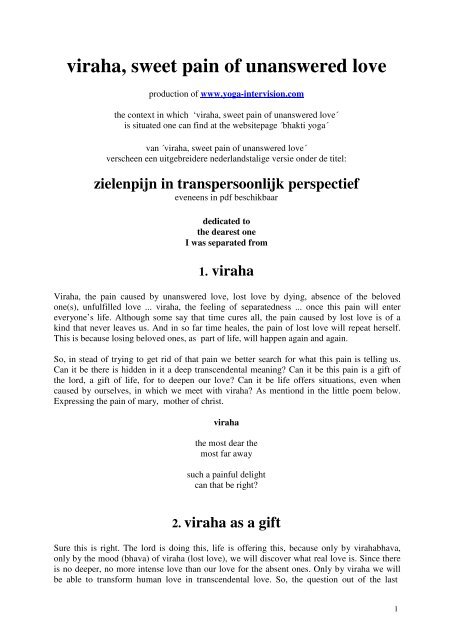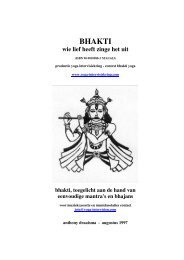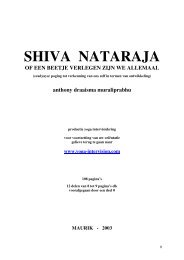viraha, sweet pain of unanswered love - Yoga Intervision
viraha, sweet pain of unanswered love - Yoga Intervision
viraha, sweet pain of unanswered love - Yoga Intervision
You also want an ePaper? Increase the reach of your titles
YUMPU automatically turns print PDFs into web optimized ePapers that Google loves.
<strong>viraha</strong>, <strong>sweet</strong> <strong>pain</strong> <strong>of</strong> <strong>unanswered</strong> <strong>love</strong><br />
production <strong>of</strong> www.yoga-intervision.com<br />
the context in which ‘<strong>viraha</strong>, <strong>sweet</strong> <strong>pain</strong> <strong>of</strong> <strong>unanswered</strong> <strong>love</strong>´<br />
is situated one can find at the websitepage ´bhakti yoga´<br />
van ´<strong>viraha</strong>, <strong>sweet</strong> <strong>pain</strong> <strong>of</strong> <strong>unanswered</strong> <strong>love</strong>´<br />
verscheen een uitgebreidere nederlandstalige versie onder de titel:<br />
zielenpijn in transpersoonlijk perspectief<br />
eveneens in pdf beschikbaar<br />
dedicated to<br />
the dearest one<br />
I was separated from<br />
1. <strong>viraha</strong><br />
Viraha, the <strong>pain</strong> caused by <strong>unanswered</strong> <strong>love</strong>, lost <strong>love</strong> by dying, absence <strong>of</strong> the be<strong>love</strong>d<br />
one(s), unfulfilled <strong>love</strong> ... <strong>viraha</strong>, the feeling <strong>of</strong> separatedness ... once this <strong>pain</strong> will enter<br />
everyone’s life. Although some say that time cures all, the <strong>pain</strong> caused by lost <strong>love</strong> is <strong>of</strong> a<br />
kind that never leaves us. And in so far time heales, the <strong>pain</strong> <strong>of</strong> lost <strong>love</strong> will repeat herself.<br />
This is because losing be<strong>love</strong>d ones, as part <strong>of</strong> life, will happen again and again.<br />
So, in stead <strong>of</strong> trying to get rid <strong>of</strong> that <strong>pain</strong> we better search for what this <strong>pain</strong> is telling us.<br />
Can it be there is hidden in it a deep transcendental meaning? Can it be this <strong>pain</strong> is a gift <strong>of</strong><br />
the lord, a gift <strong>of</strong> life, for to deepen our <strong>love</strong>? Can it be life <strong>of</strong>fers situations, even when<br />
caused by ourselves, in which we meet with <strong>viraha</strong>? As mentiond in the little poem below.<br />
Expressing the <strong>pain</strong> <strong>of</strong> mary, mother <strong>of</strong> christ.<br />
<strong>viraha</strong><br />
the most dear the<br />
most far away<br />
such a <strong>pain</strong>ful delight<br />
can that be right?<br />
2. <strong>viraha</strong> as a gift<br />
Sure this is right. The lord is doing this, life is <strong>of</strong>fering this, because only by <strong>viraha</strong>bhava,<br />
only by the mood (bhava) <strong>of</strong> <strong>viraha</strong> (lost <strong>love</strong>), we will discover what real <strong>love</strong> is. Since there<br />
is no deeper, no more intense <strong>love</strong> than our <strong>love</strong> for the absent ones. Only by <strong>viraha</strong> we will<br />
be able to transform human <strong>love</strong> in transcendental <strong>love</strong>. So, the question out <strong>of</strong> the last<br />
1
sentence <strong>of</strong> the little poem is no question! But a statement, saying: yes, this <strong>pain</strong>ful delight is<br />
right ! This is because the ones who do receive <strong>viraha</strong> from the lord, from life, will unveil<br />
their immortal invulnerable soul as well as their soul’s quality to <strong>love</strong> all human beings, all<br />
living beings, whole existence.<br />
This is because after some time, - it can take years and years - , by the grace <strong>of</strong> the lord, <strong>of</strong><br />
life, or by the intermediary <strong>of</strong> guruji (spiritual teacher), the <strong>pain</strong> <strong>of</strong> <strong>viraha</strong>, our crying, will<br />
purify us. As a corresponding result we will encounter, increasingly, the absent be<strong>love</strong>d<br />
one(s) in everyone everywhere everytime. As said by lord krishna in chapter 6 <strong>of</strong> his<br />
bhagavad gita (vs 29 - 32).<br />
This purifying does rise out <strong>of</strong> our wounded, broken hearts. Then we know: our hearts cannot<br />
been wounded, cannot been broken. By that they just open themselves. Realising their<br />
essence: sensibility, beïng moved. Capable to feel the <strong>pain</strong> <strong>of</strong> others as well as to rejoice their<br />
happiness. Enjoying the little things <strong>of</strong> life. As if being a child again. Once we come near to<br />
this, by and by our crying will end. Our thrust in <strong>love</strong> will be restored. Even ananda, quiet joy,<br />
heavenly bliss, will come. As a result <strong>of</strong> unconditional universal <strong>love</strong> as pointed unto in the<br />
bhagavad gita-verses as mentioned before.<br />
3. conventional life, <strong>pain</strong> included, as unreal<br />
Of course our feeling <strong>of</strong> <strong>pain</strong>, caused by <strong>unanswered</strong> <strong>love</strong> does exist, once we feel that <strong>pain</strong>,<br />
since we feel that <strong>pain</strong>. It would be cruel, very cruel to deny that. Nevertheless we don’t live<br />
totally identified with that <strong>pain</strong>. We are not the <strong>pain</strong>. Much more we are. Or bettter: all we can<br />
feel we just are not. None <strong>of</strong> our innumerable identity-aspects we experience, may it be by<br />
joy, may it be by suffering, can define our identity essentially.<br />
For that wisdom we don’t need to sit at the feet <strong>of</strong> advaita vedantists, zen boeddhists or<br />
whatever teacher we like to go to. We by ourselves can notice it. By observing our <strong>pain</strong>. By<br />
observing the situation that causes that <strong>pain</strong>. The situation we are involved in. Then we see:<br />
almost at the same time as we feel our <strong>pain</strong>, it seems as if our <strong>pain</strong> as well as that situation are<br />
not real. As if, deep down, we are not hurted. As if, essentially, we are not moved by that.<br />
Trust it. It is true. Life, althoug conventionally real, essentially is a dream. The only thing we<br />
have to do is to trust this experience. Indeed nobody, nothing can hurt our soul. Indeed, it is<br />
no other then our soul, our eternal invulnerable soul, we do meet in that „unrealness-<br />
observation“ ours.<br />
As said: trust is needed. This is because in psychological sense the experience <strong>of</strong> unrealness<br />
most <strong>of</strong>ten will be seen as denial. Denial <strong>of</strong> traumatic events. For the time being necessary for<br />
surviving. But in case denial takes to much time trauma-psychologists do fear denial will turn<br />
out as a fundamental disturbance for healing. Leading even unto worse, unto forms <strong>of</strong><br />
depersonalising. So time is needed. For going into that <strong>pain</strong>. For confrontation with our <strong>pain</strong>.<br />
4. we need someone who dares to confront us<br />
For coming near to these realisations we need someone who, in time, is saying: stop crying!<br />
Someone, guruji or a dear one to us, who dares to say: your crying shows that you don’t really<br />
2
accept life, that you don’t accept opposites in life. Who dares to say: your grieving shows you<br />
don’t really believe in man’s untouchable immortal soul. As krishna is stating (bhagavad gita<br />
ch. 2 vs 11 - 30). Someone we need who says: this, your crying, shows you don’t believe in<br />
your experiencing conventional life as a dream. As „at the same time-unreal“. You don’t<br />
believe that that feeling indicates the only real: your soul.<br />
Of course this transcendental counseling doesn’t help if done premature. If done immediately<br />
after dramatically life-events. Timing is very important. For example: suppose a man or<br />
woman doesn’t get “own“ children, then first he or she has to mourn. Beïng sad about it. As<br />
long as needed. You can’t immediately say to him or her: “you can <strong>love</strong> all children, since<br />
there are so many who need your <strong>love</strong>“. Saying that in the midst <strong>of</strong> their mourning, how well-<br />
meant it may be, will be experienced as cruel. The same will be experienced in case <strong>of</strong><br />
premature help <strong>of</strong> this kind when someone loses his be<strong>love</strong>d parents, his be<strong>love</strong>d life-partner.<br />
By dead or betrayal or whatsoever.<br />
Or suppose a man looses his child, and, then again, he looses a child, you can’t immediately<br />
say to him that his <strong>pain</strong> is known as <strong>viraha</strong>, that this <strong>pain</strong>, his <strong>pain</strong>, is a gift <strong>of</strong> the lord, a gift<br />
<strong>of</strong> life. First he has to undergo shock. By feeling the reality <strong>of</strong> what did happen. So he has to<br />
cry and to cry and to cry. And if he doesn’t, everyone is hoping that he soon will start crying.<br />
Then, slowly, slowly, there will come the moment that guruji, or a dear one to that man,<br />
carefully can point to him that his soul reveals herself to him. That <strong>viraha</strong> is the case as well.<br />
Sometimes guruji, or that dear one, after a first trying, has to waite some time more. But,<br />
surely, once there will come the moment that the shocked ones will start crying. And, after<br />
that, the mourning ones will understand. So finally guruji or a dear one to them, they will be<br />
heard when saying: stop crying ... accept life ... accept opposites in life ... no one, nothing, can<br />
touch man’s immortal soul ...<br />
5. ultimately transformation <strong>of</strong> <strong>pain</strong> is the way<br />
This hearing will surely happen. If not in this life then in next life or in the next one. This is<br />
because our inherent nature is to <strong>love</strong> all and everything, unconditionally universally. Since<br />
our core’s quality, are soul’s quality, is <strong>love</strong>. Ulimately <strong>viraha</strong>, the <strong>pain</strong> caused by <strong>unanswered</strong><br />
<strong>love</strong>, is the means for to discover that core, for to discover our soul, as well their quality.<br />
Psychological help, although surely needed, will bring no final solution neither will bring us<br />
to that - , our inborn <strong>love</strong>-state. Psychological help is useful and necessary for to overcome<br />
shock, for to bring crying into presence. For bringing us back to the reality <strong>of</strong> daily life.<br />
Nevertheless in time psychological help will be turn out as contraproductive. This is because<br />
mourning as everlasting process ultimately is conditioning us unto <strong>love</strong> as a claim. Unto<br />
attachment towards the not-real. Towards the not-self. As long as we are doïng that, <strong>viraha</strong> as<br />
part <strong>of</strong> life will come again and again. Only transformation to a transcendental level will give<br />
the solution. Will give birth to our soul and her quality, which is, as said before, universal<br />
unconditional <strong>love</strong>. In fact it is more difficult to reach this state when one does have luckely<br />
“own“ children. This is because <strong>of</strong> our natural clinging to own children. The most clear in<br />
case <strong>of</strong> difficulties. Then there is the tendency to exclude other children in favour <strong>of</strong> ours.<br />
3
6. we are souls on a karmic way<br />
Although “own“ children, seen out <strong>of</strong> a transcendantal scope, are no other then a direct bridge<br />
towards universal unconditional <strong>love</strong>, this is, generally spoken, a rare fenomenon. This is not<br />
only because <strong>of</strong> our clinging to them, but also because <strong>of</strong> our blindness for the existence <strong>of</strong><br />
each <strong>of</strong> our children, as well <strong>of</strong> all children, as a specific manifestation <strong>of</strong> the same eternal<br />
soul we all are. All <strong>of</strong> them on their way towards their final divine destination. Through and<br />
passing many many lives.<br />
The same <strong>of</strong> course is the case with ourselves. Our genetic heritage (nature) as well as our<br />
social- and educational development (nurture) we are involved in, are, although important, not<br />
essential in the way we <strong>of</strong>ten think. Of course we have to deal with our genetic potential, to<br />
accept and to explore our inborn capacities. And sure, if needed, we have to heal from<br />
miseries out <strong>of</strong> our development-history. More essential however is the fact that our social as<br />
well our genetic characteristics are no other than the material resp. expressions <strong>of</strong> the karmic<br />
predispositions we brought with us as a result <strong>of</strong> our former lives.<br />
Together they form the basic as well as the instruments with the help <strong>of</strong> which we have to<br />
bring our souls unto a higher plane. Seen out <strong>of</strong> the scope <strong>of</strong> the law <strong>of</strong> karma, they, - our<br />
genetic luggage, our social-educational context as well as our karmic predispositions - , do<br />
<strong>of</strong>fer the best suitable possibilities for that.<br />
7. the meaning <strong>of</strong> relationship<br />
Although we may speak about that in this way we don’t really encounter our children with<br />
deep respect for this thruth. Most <strong>of</strong> the time we do forget that they did take birth at us not as<br />
a result <strong>of</strong> a socalled own decision but that they were trusted to us for passing through a stage<br />
within their own karmic voyage as said before. Otherwise, if we did realise that thruth, we<br />
were more succesfully with allowing resp. facilitating them to go their own path.<br />
Feelings <strong>of</strong> guilt towards them, our children, feelings <strong>of</strong> shame, and so on, these feelings<br />
indicate our ignorance. We are not the ones who finally determinate the development <strong>of</strong> our<br />
children and their lifegoings. We only facilitate their voyage by a given genetic structure<br />
(nature) as well as by our <strong>love</strong> and care (nurture). Even when we fall short. The same is the<br />
case as far as the growing <strong>of</strong> our <strong>love</strong> and care towards unconditional universal <strong>love</strong> is<br />
concerned. In order to bring our <strong>love</strong> on a higher plan our children, our children indeed, they<br />
in turn, are facilitating us.<br />
Therefore, related to our children, in a way our falling short to them is no other than falling<br />
short towards our own life-mission. No other than falling short towards all sentient beïngs.<br />
Towards whole existence.<br />
That’s indeed what is meant by the karmic wisdom that says: “parents and children they do<br />
fulfill each others karma“. Karmic interrelated they are <strong>of</strong>fering each other the opportunity<br />
and support to transform themselves to a higher plane. Not entangled in - , but with the<br />
intermediary <strong>of</strong> their relationship.<br />
4
8. krishna in disguise<br />
This is the case with all human relations. Also, if not especially, with and between the happily<br />
married ones. They in particular are fulfilling and supporting the karmic voyage each one <strong>of</strong><br />
them is going. Towards unveiling their souls. If giving consciously support to each other they<br />
are transforming their relationship unto a sacrament. Making their lives holy. However, <strong>of</strong>ten<br />
it is difficult for them to reach that holy goal, the divine goal we all strive to: the state <strong>of</strong><br />
unconditional universal <strong>love</strong>.<br />
Seen out <strong>of</strong> the scope <strong>of</strong> male-female-relations the way towards that is to worship in every<br />
man the lord, the creative principle. And to worship in every woman shakti, divine mother.<br />
The care-pinciple. Helas, this truth is nowadays seldom heard. Man and woman are inclined<br />
to consume their <strong>love</strong> for each other on human plane only. In stead <strong>of</strong> to worship each other,<br />
celebrating their karmic interrelatedness.<br />
Because this sacramental secret <strong>of</strong> relationship is disappearing these days, the solitaries <strong>of</strong>ten<br />
they reach more easely the state <strong>of</strong> transcendental <strong>love</strong>, the state <strong>of</strong> unconditional universal<br />
<strong>love</strong>. By the grace <strong>of</strong> the lord, or by intermediary <strong>of</strong> guruji or a dear one to them, once they<br />
will transcend and transform <strong>viraha</strong> , - their <strong>pain</strong> because <strong>of</strong> their unfulfilled desire to <strong>love</strong> one<br />
another human in particular - , unto unconditional universal <strong>love</strong>. Encountering everyone as<br />
be<strong>love</strong>d one. As krishna states (bhagavad gita ch 6 vs 29). Understanding: no one is ours.<br />
Experiencing the other, whoever it may be, as krishna in disguise. Since it is he, it is life, who<br />
does arrange our relational circumstances. His play we are.<br />
9. dedication<br />
I hope these thoughts will bring relief to the ones who mourn, shocked by <strong>unanswered</strong> <strong>love</strong>,<br />
lost <strong>love</strong>, unfulfilled <strong>love</strong>-desires and/or traumatic events. Deeply I hope they will meet the<br />
source <strong>of</strong> their mourning, the purpose as well the results: <strong>love</strong>, unconditional universal <strong>love</strong>.<br />
May be these considerings will bring some support as well unto those who are undergoing the<br />
<strong>pain</strong> <strong>of</strong> not being able to help in case <strong>of</strong> dear ones’ <strong>love</strong>-sufferings. May be ‘<strong>viraha</strong>, <strong>sweet</strong><br />
<strong>pain</strong> <strong>of</strong> <strong>unanswered</strong> <strong>love</strong>’ will be useful for those, who, witnessing the <strong>pain</strong> <strong>of</strong> their dear ones,<br />
have to give them actual freedom for their own karmic way.<br />
Finally I hope this will bring parents, children and happily related ones, some more<br />
understanding about the transcendent meaning <strong>of</strong> their relatedness.<br />
Anthony Draaisma christmas 2003<br />
- - -<br />
in order to continue your exploration please go back to<br />
www.yoga-intervision.com<br />
5
NOTES<br />
(1) Ultimately „<strong>viraha</strong>“ stands for the feeling <strong>of</strong> being separated from the be<strong>love</strong>d divine. This<br />
is called by christian mystics „dark night <strong>of</strong> the soul“. Within krishna-bhakti <strong>viraha</strong> is very<br />
prominent. Viraha is the core <strong>of</strong> the relation between radha and the gopi’s (cowherd-maids as<br />
well as krishnadevotees <strong>of</strong> all times) at one side and krishna at the other. Especially by his<br />
absence, by his play <strong>of</strong> hide and seek, the gopi’s resp. krishnadevotees are experiencing their<br />
<strong>love</strong> for krishna. This is expressed in many bhajans (songs <strong>of</strong> praise). The most famous <strong>of</strong> this<br />
kind are the bhajans <strong>of</strong> the female saint meerabai (16e century).<br />
(2) In christianity the most famous archetype <strong>of</strong> <strong>viraha</strong> is maria, the mother <strong>of</strong> jezus. In many<br />
icon’s maria is looking at her young son on a sad way. Often even she looks away. She knows<br />
soon she will loose him. The little <strong>viraha</strong>-poem out <strong>of</strong> the essay is adressed to her. To maria,<br />
with jezus, her son on her lap. In the socalled piëta maria is holding jezus, this time after his<br />
dying, on her lap too. This also is a very famous expression <strong>of</strong> <strong>viraha</strong>. Numerous exemples <strong>of</strong><br />
the piëta one can find at christian cemeteries.<br />
(3) Probably the most pregnant, the most transcendental exemple <strong>of</strong> <strong>viraha</strong> in christianity is<br />
jezus himself. His <strong>pain</strong> was not at the first place a fysical one but is concerning the <strong>pain</strong><br />
caused by man’s incapability to answer his <strong>love</strong> by <strong>love</strong>. As can be concluded hearing his<br />
words on the cross: father please forgive them since they don’t know what they are doïng.<br />
(4) In greek drama one can find <strong>viraha</strong> expressed, for example, by the mythe <strong>of</strong> orpheus and<br />
euridice as well as by the narcissusmyth. Shakespeare’s romeo and julia (late middle ages)<br />
shows the like. One <strong>of</strong> the most famous <strong>viraha</strong>-expressions <strong>of</strong> the last centuries can be seen<br />
when visiting rodin’s „fugit amor“ (<strong>love</strong> that flees/<strong>unanswered</strong> <strong>love</strong>). This sculpture (musée<br />
rodin, paris) shows a desparate <strong>love</strong>r, named paolo, who is stretching in vain his arms<br />
backwards towards his be<strong>love</strong>d, named francesca. She is desperate too. These two <strong>love</strong>rs are<br />
figuring in dante’s famous divina comedia. Their <strong>love</strong> was forbidden since francesca was<br />
engaged to giancotto, paolo’s elder brother. After being murdered the punishment <strong>of</strong> paolo<br />
and francesca in hell did consist out <strong>of</strong> eternal beïng near without beïng able to touch each<br />
other. By the way, rodin did sculpture paolo and francesca also very close to each other. That<br />
sculpture, far more famous than „fugit amor“, is known as „the kiss“. Although now they are<br />
kissing each other, in a way they are hiding it: we can´t see fully their meeting lips. Moreover,<br />
closely looking one can see clearly how they hesistate to go more intimate. Especially paolo.<br />
Knowing their <strong>love</strong> was forbidden, knowing they soon would be seperated roughly, rodin<br />
shows in „the kiss“ their kissing as <strong>sweet</strong> as well as <strong>pain</strong>ful at the same time.<br />
(5) Viraha in psychological sense is known as a positive commitment to others and/or to<br />
unselfish life-values. However without fulfilment, without positive response. As a result <strong>of</strong><br />
that this <strong>love</strong>, this commitment, leads to negative feelings as depression, despair, helplesness,<br />
fear, seperatedness, guilt, anger etc. As explained by the dutch personality-psychologist<br />
hubert hermans in his famous valuationtheory. Hermans did call these feelings „fugit amor“,<br />
<strong>love</strong> that flights (see note before). Shortly notated as (A -). In that (A) stands for “another“<br />
and (-) for “negative feelings“. The (A) motive is one <strong>of</strong> the basic motives <strong>of</strong> man. Next to the<br />
(Z) motive. That (Z) stands for “zelf“. In english: the self, the own person self (not the higher<br />
self). In case <strong>of</strong> dominancy <strong>of</strong> (Z) we go for selfesteem, selfcertainity, capability, proudness.<br />
(6) For more about <strong>viraha</strong> in psychological sense see hubert j. m. hermans, els hermans-<br />
jansen, willem van gilst: „de grondmotieven van het menselijk bestaan, hun expressie in het<br />
6
persoonlijk waarderingsleven“, uitg. swets & zeitlinger, lisse 1985. Also: hermans hubert j.m.,<br />
„het verdeelde gemoed; over de grondmotieven in ons dagelijks leven“, uitg. nelissen, baarn<br />
1986. For publications by hermans in english language see www.socsci.kun.nl.<br />
(7) Seen out <strong>of</strong> the scope <strong>of</strong> our transcendental way, our way towards unconditional universal<br />
<strong>love</strong>, our <strong>viraha</strong>, our (A -) feelings, are hidden (Z) feelings. If we don’t transform our (A -)<br />
feelings, our <strong>pain</strong> <strong>of</strong> <strong>viraha</strong>, the <strong>pain</strong> caused by <strong>unanswered</strong> <strong>love</strong>, unto unconditional universal<br />
<strong>love</strong> (A) we stay captured by (Z). Captured by our ego.<br />
(8) Viraha makes clear the essence <strong>of</strong> our heart. This essence is: vulnerability. Indeed, before<br />
reaching universal unconditional <strong>love</strong>, first our heart has to be broken. Although it never<br />
breaks. It is, by the <strong>pain</strong> <strong>of</strong> <strong>viraha</strong>, just opening herself. Because <strong>of</strong> this, although <strong>of</strong>ten<br />
unconscious about that reason, so many old people’s tears are so prone. The heart’s<br />
vulnerability is not contradictory to the truth <strong>of</strong> man’s untouchable immortal soul. The latter<br />
completes the first, does strengthen the heart. Otherwise, finally, by witnessing and/or helping<br />
others to endure their <strong>pain</strong> our own hearts will collapse.<br />
(9) For more about how to strengthen our hearts while growing in compassion, please visit<br />
www.worldprayer-lordhavemercy.com and read the essay „praying for the world“ (subtitle:<br />
how to relate to the <strong>pain</strong> <strong>of</strong> the world).<br />
(10) Corresponding to aging most <strong>of</strong> us experience their tears as more prone as before.<br />
Sometimes / some older people are bothering about that. Ashamed not being able to prevent<br />
or repress their tears. Once they understand their hearts sensibility, as the positive result <strong>of</strong><br />
their former <strong>viraha</strong>-experiences, they loose their shame as well as regain their selfcontrol as<br />
far as needed. This is since the sensible heart is no other then the immortal invulnerable soule.<br />
When conscious <strong>of</strong> that, our heart is equally strong.<br />
- - -<br />
there is no dutch translation <strong>of</strong> ´<strong>viraha</strong>, <strong>sweet</strong> <strong>pain</strong> <strong>of</strong> <strong>unanswered</strong> <strong>love</strong>´ available - one <strong>of</strong> the<br />
other yoga-intervisionproductions, in dutch language only, concerns approximately the same<br />
issues as covered by ´<strong>viraha</strong>´ - even more elaborated - called ´zielenpijn in transpersoonlijk<br />
perspectief´ - this dutch version is also in pdf available - via www.yoga-intervision.com<br />
van ´<strong>viraha</strong>, <strong>sweet</strong> <strong>pain</strong> <strong>of</strong> <strong>unanswered</strong> <strong>love</strong>´ is geen nederlandse versie beschikbaar - een van<br />
de overig yoga intervisieproducties gaat echter over ongeveer dezelfde materie - echter<br />
uitgebreider - getiteld ´zielenpijn in transpersoonlijk perspectief´ (over de zin van relationele<br />
verwikkelingen en pijn) - beschikbaar in pdf via www.yoga-intervision.com<br />
- - -<br />
visit also www.worldprayer-lordhavemercy.com<br />
another initiative taken by the yoga-intervisioncircle<br />
7






